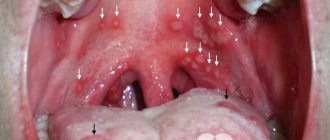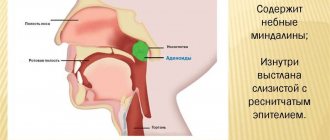Incubation period of acute respiratory infections in adults
ARI is characterized by local damage to the respiratory tract, and there is not necessarily any significant increase in temperature. At least it exceeds 38 degrees in very rare cases. The development of the disease is slow and it does not tend to spread to other organs. Intoxication is either completely absent or expressed in a weak form.
An acute respiratory infection begins abruptly, and the signs of the disease are noticeable and striking every time. Unlike ARVI, it is not necessarily caused by a viral infection and for a long time the patient may not pose a threat of infection to others.
The incubation period for acute respiratory infections in adults can be up to two weeks. Throughout this entire period of time, the patient may not experience any changes in his condition, since there may be no temperature. There are also no other manifestations of the disease.
ORZ: what is this?
ARZ (acute respiratory diseases) are diseases of the respiratory system that are characterized by inflammation of the mucous membranes, a short incubation period, fever and intoxication of the body. Infection occurs through airborne droplets and household contact. Acute respiratory diseases in adults are often seasonal (occur in spring, winter and autumn).
The symptoms of these diseases depend on the types of viruses. The cause of the occurrence and development of acute respiratory infections is the vital activity of influenza, parainfluenza, adenoviruses, rhinoviruses, etc. The peak incidence occurs in February every year.
Causes of frequent acute respiratory infections in adults
The lifestyle a person leads has a significant impact on the state of his health and immune system. Unfavorable factors in the case of frequent colds in adults are an unbalanced diet, a small amount of physical exercise, frequency of stress, chronic fatigue syndrome, poor quality of sleep, and being in a polluted environment. In addition, great importance is given to hygiene; in the case of unreasonably extensive use of antiseptics, as well as disinfectants, the immune system relaxes, and the viability of microorganisms increases.
The immunity of an adult can also be weakened due to the presence of parasitic diseases, such as infestations of worms and giardiasis.
The state of the internal microflora of the gastrointestinal tract is also associated with the general state of human immunity. The lack of bifidobacteria and lactobacilli in the human body causes disruptions in the well-functioning human immune system and the result of this process is numerous allergic diseases and respiratory viral diseases.
Symptoms of acute respiratory infections in adults
The appearance of the first symptoms of acute respiratory infections is usually noted on the second or third day after the onset of the disease. In some cases, the incubation period of the disease can last up to 14 days. Symptoms of acute respiratory infections in adults are observed with a tendency to gradually increase:
- The most striking symptom of the disease is a runny nose, accompanied by sneezing and general congestion of the nasal passages. In most cases, it occurs against the background of sneezing;
- in most cases, the development of the disease is accompanied by the flow of tears from the eyes;
- the presence of a white coating in the throat, accompanied by soreness and redness of the throat;
- states of chills and incipient fever;
- growth in the size of the lymph nodes, which are located under the lower jaw and in the neck.
Temperature during acute respiratory infections in adults
In acute respiratory infections, temperature is nothing more than a protective reaction of the body. If the temperature is below 38.5 degrees, no measures should be taken to bring it down. Its presence indicates that the body is taking measures to independently overcome the infection. However, if the onset of convulsions occurs against the background of a high temperature, you still need to begin to bring it down. In this case, the presence of high temperature already poses a health hazard.
Acute respiratory infections: treatment in adults
It is possible to treat a patient without placing him in a hospital facility, provided that his condition is far from serious. If the patient has a fever, it is best to adhere to bed rest and drink more fluids. Due to the contagious nature of a person, he should certainly be isolated from other people. Calling a doctor is absolutely mandatory, since only a specialist can correctly determine how exactly to treat a person.
If the disease is caused by exposure to a virus in a person, antiviral drugs should be used, as well as fever-reducing drugs and combination drugs. Very often, a doctor prescribes interferon to treat a disease. For medicinal purposes, you can use drops for a runny nose, the effect of which is based on vasoconstriction, as well as oxolinic ointment and vitamin complexes.
It happens that to treat a disease, the doctor recommends taking homeopathic remedies, such as aflubin and influcid. When bronchospasm develops, the use of bronchodilators, such as Teopek and Euphilin, is effective. At the first stages of treating the disease, cough medications and narcotic and non-narcotic drugs can be used for medicinal purposes. In the future, when sputum is discharged, it is recommended to take bromhexine.
Antibiotics are indicated for chlamydial, bacterial and microplasma etiologies of the disease. After identifying the causative agent of the disease, only a doctor can prescribe certain medications. Due to the risk of a large number of side effects, you should not take antibiotics on your own. If the course of acute respiratory infections occurs against the background of the development of pneumonia, treatment with antibiotics is also necessary.
In severe cases of the disease and the development of all kinds of complications, hospitalization of the sick person may be necessary. In this case, the direction of further treatment should be determined only by the attending physician and he should be guided by the severity of the patient’s condition. You can use not only antibiotics, but also hormonal-based drugs.
Vasoconstrictors
Vasoconstrictors are symptomatic therapy drugs that are used in short courses for nasal congestion. Most often they try to do without them. But in the absence of nasal breathing, the following drugs are used:
- Vibrocil nasal drops;
Most often, such drops are used for acute viral diseases; they are not addictive - Rhinorus;
- Farmazolin;
- Cromohexal (it also has antihistamine properties);
- Knoxprey;
- Sialor Rhino.
The product is effective against the runny nose, can be used for a long time, as it is not addictive
In folk medicine, inhalations with esters - eucalyptus, menthol, pine, fir - had a vasoconstrictor effect. Nowadays, hot inhalations with Gevkamen or Doctor MOM ointments are practiced. Irrigating products also help relieve nasal congestion. From this group, Marimer, Aquamaris (follow the link for instructions for Aquamaris), Aqualor, and, as folk analogues, rinsing with saline or saline are used. Also read how to rinse your baby’s nose with saline.
Vasoconstrictor drugs are used in very short courses - no more than 5 days. This is explained by rapid addiction, due to which the patient acquires medicinal or vasomotor rhinitis.
Doctor Mom ointment is also used to treat cough. Follow the link to see instructions for Doctor Mom ointment.
How to treat acute respiratory infections in an adult?
ARI in an adult can be treated with antiviral drugs, since they can eliminate the cause of the onset of the disease. Taking them allows you to transfer the course of the disease to a mild form and interrupt it a few days earlier. In addition, the risk of complications during treatment of the disease is reduced. You should not self-medicate, even considering the fact that these drugs are completely freely available in pharmacies. Their use without proper control over a long period of time can lead to a decrease in the level of the body’s overall immune defense and it will not only be unable to resist infections, but may also allow the development of oncology. Moreover, unauthorized treatment of persons suffering from varying degrees of diabetes mellitus with all kinds of arthritis poses a danger. It’s good if treatment with such drugs simply does not bring any benefit.
The best medicine for acute respiratory infections in adults
Due to the fact that the respiratory disease occurs against the background of inflammation of the nasopharynx, manifested in nasal discharge or congestion, sore throat and redness when swallowing, we can say that the best and mandatory medicine for use against acute respiratory infections in an adult is rinsing the nasopharynx and gargling procedures. In this case, you can rinse with a solution of:
- chamomile decoction;
- salt;
- furacillin tablets.
The best of all rinsing methods can be considered rinsing with a salt solution. To prepare it, you need to dissolve half a teaspoon of table salt and the same amount of soda in half a glass of water. Adding a couple of drops of iodine or tea tree oil is effective.
After rinsing, you can treat the throat with a medicinal aerosol or dissolve a tablet of the drug from the pharmacy (faringosept, septolete) in your mouth.
Antibiotics for acute respiratory infections in adults
An adult needs to know well the names of some drugs prescribed by a doctor for the treatment of acute respiratory infections. Such antibiotics are divided into four main groups:
- Macrolides, which are the most powerful of all antibiotics. Among them are azithromycin and other drugs.
- Fluoroquinolones, including moxifloxacin, levofloxacin and other agents.
- The penicillin group includes the following types of antibiotics: amoxicillin, ampicillin, augmentin, amoxiclav.
- The cephalosporin group includes drugs such as axetil, cefuroxime, and cefixime.
- Mix linden, chamomile, yarrow, mint flowers in different proportions. One tablespoon of the resulting composition should be poured with boiling water in a volume of one liter. After forty minutes, strain the resulting mixture and drink it;
- Using ginger tea helps with severe chills. To prepare it, grate fresh ginger root and, after pouring boiling water over it, keep it on low heat. After the infusion has cooled, add a little honey to it and drink;
- mix aloe and honey in equal proportions and drink one glass at night. A good proven remedy for the treatment of acute respiratory infections in adults.
Folk remedies for acute respiratory infections in adults
Folk remedies for acute respiratory infections in adults involve drinking plenty of fluids in order to relieve symptoms of intoxication of the body. In this regard, sour fruit drinks made from the following plants are good: rose hips, viburnum, lingonberries, cranberries. In addition, you can take tea with lemon and herbal infusions, the effect of which is aimed at relieving inflammation. There are several recipes that can help relieve inflammation during acute respiratory infections:
Antibacterial agents
Antibiotics are drugs used for purulent manifestations of acute respiratory infections. This is the presence of discharge with a corresponding color and smell from the nose, as well as plaque, blisters on the mucous membranes of the throat and tonsils. Bacterial diseases without the use of this group of medications can last a long time, and even become chronic. ARVI and Influenza: treatment and list of drugs.
Main representatives of the group:
- Flemoxin Solutab;
Effective pills to prevent disease - Augmentin;
- Flemoklav Solutab;
- Sumamed;
- Suprax;
Effective antibiotics, but dosage should be monitored - Cefixime;
- Zinnat;
- Klacid.
Effective tablets that should be used as prescribed by a doctor and ensure the correct dosage
Fast-acting antibacterial cold medicines. They are used in short courses – 5-7 days. The penicillin group (Augmentin, Flemoxin, Flemoclav, Amoxil) is considered to be the most effective, and if there is an allergic reaction or pathogens have already developed resistance to their action, then cephalosporins (Cefixime, Pancef, Suprax) are used.
Antibiotics for a runny nose cannot be replaced with folk remedies, since their action is aimed directly at bacteria. They have a bacteriostatic and bactericidal effect, destroying the causative agent of infection, while traditional methods can mask symptoms or even worsen the patient’s condition.
Complications after acute respiratory infections in adults
The most common complications after acute respiratory infections in adults include the following conditions:
- acute sinusitis. An even more common complication after an acute respiratory infection is an inflamed sinus condition called bacterial sinusitis. Manifests itself in the forms of sphenoiditis, frontal sinusitis, sinusitis;
- acute otitis media This name is given to middle ear disease, a very unpleasant condition related to complications of colds;
- acute form of bronchitis. Bronchial damage can be caused by exposure to a bacterial infection;
- The most dangerous complication of acute respiratory infections can be called pneumonia. The diagnosis can be made based on a comprehensive examination of the patient, however, in the case of a standard cold, the patient's condition may not improve for a period of a week to 10 days. The high temperature does not go away and there is a cough. In this case, medical consultation is necessary.
Prevention of acute respiratory infections in adults
To carry out high-quality and reliable prevention of acute respiratory infections in an adult, it is necessary to ensure the formation of the full functioning of his immune system, which occurs as a result of maintaining a healthy lifestyle, developing a healthy diet, as well as using a variety of hardening procedures.
First of all, the prevention of acute respiratory infections consists of stopping all possible contacts with carriers of this disease, carrying out sanitary and epidemiological measures, and limiting stay in public transport. In addition, scientists have proven the fact that acute respiratory infections are dependent on smoking, and smoking may not necessarily be active, but also passive.
In addition, for preventive purposes, taking a complex of immunomodulatory drugs may be indicated. Due to the activation of the body's immune reactions, the mucous membranes are restored, which has a positive effect on the protection of the respiratory organs. Among herbal remedies, we can recommend for prevention such as Immunal, Immunorm.
How to prevent the development of respiratory diseases
Prevention of acute respiratory infections is an important component of the effective fight against this group of diseases. It includes recommendations for lifestyle changes:
- Maintaining physical fitness;
- Strengthening the immune system by hardening;
- Maintaining a nutritious, varied diet;
- Timely treatment of acute and chronic diseases;
- Rejection of bad habits.
Prevention of ARVI in adults and children also involves vaccination against influenza before outbreaks of epidemics. Vaccination does not guarantee 100% absence of the disease, but even if the disease develops, it reduces the risk of complications.
It is impossible to be vaccinated against all pathogens of acute respiratory infections, therefore it is recommended to additionally use immunostimulating agents1.












